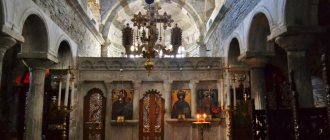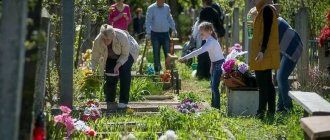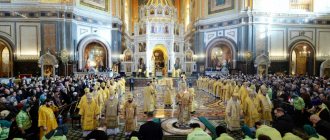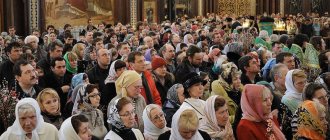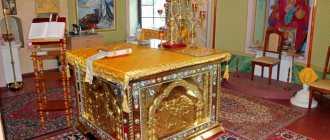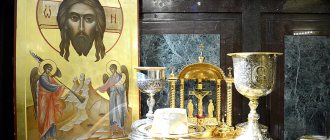How to behave correctly in the Orthodox Church
A beginner who is just starting his spiritual path should feel free, monitor the behavior of other people and do the same. In order not to unknowingly disturb the peace in the souls of other praying people and not to desecrate the greatness of the holy place, it is necessary to know and follow certain rules for finding a church.
Here are some highlights:
- If a priest approaches, for example, during the burning of incense, you cannot stand in his way, but you need to step aside.
- You shouldn’t behave like you’re in a museum and openly look at those around you. As a rule, it is customary to stand with your head slightly bowed.
- Whether in a small church, a cathedral or a monastery, one should always behave with reverence.
- If you want to attend a church service, it is advisable to arrive a few minutes before the service starts.
- You cannot enter the altar, nor turn your back to the altar.
- If you want to sing along in prayer, then you need to do this in a quiet voice, making sure that your singing does not distract the people standing nearby.
- It is permitted to sit in church if you are ill or if you are very tired, that is, in weakness. It is not allowed to sit cross-legged.
- During kneeling prayers, which occur at various services, you should pray together with all the parishioners. At this moment, both the clergy in the altar and the parishioners kneel and unite in a single prayer (the priest reads special prayers aloud).
- If you are on the temple grounds, you are not allowed to smoke or take animals or birds with you.
- If there is a reading of the Gospel, the chant of the Cherubim or the Eucharistic Canon, you should just stand still and listen. You should not walk, talk, or light candles at this time.
- You need to refrain from making comments to your neighbors so as not to cause embarrassment to them, or speak in a quiet and friendly voice. It is advisable to remain in place until the end of the service; you can leave if there is a need or if you feel unwell.
For those beginning to get acquainted with Orthodoxy, it can be important in what order and which icons to approach in church. There is no strict rule in this case. Most often, they first try to approach the icon located on the lectern in the middle of the temple. This is an icon of the saint whose holiday is celebrated on this day.
Near her they cross themselves twice and apply their lips and forehead, and cross themselves again. Then they approach the icons of the Savior, the Mother of God and those saints to whom there is a request or the soul is drawn.
You may find this article useful on how to properly consecrate an apartment.
What do priests say about corruption?
Priests, by the nature of their work, confront demons and express their opinion about such a phenomenon as corruption. Archpriest Dmitry Smirnov confirms the fact of the existence of corruption, which takes place both in the world and among church officials. He answers affirmatively to questions about the presence of corruption in the life of any person, as a result of the influence of demons on a soul that has been tempted and departed from God.
Pointing to the fact that God is the main force in the Universe, he argues that an Orthodox person who believes in the Holy Trinity is completely protected by his faith, because nothing can disrupt his life without God's knowledge. Smirnov believes that if a person recognizes , that there are unclean forces equal in power to God, thereby he refuses his protection and help and surrenders himself to their power.
Priest Mikhail Vorobyov, rector of the temple, believes that any suffering is only for the benefit of everyone. You can become a person in the true sense of the word only by patiently bearing your cross, which is destined by fate. Illnesses and misfortunes that befall a Christian allow him to discover his true self and free himself from superficial and unnecessary garbage. People who have suffered and lost a lot are much more tolerant and kinder than those who lived their whole lives like Christ in the bosom. This priest argues that all people experience suffering at some point in their lives, and they should not be perceived as the result of someone’s negative program, which is called corruption.
Priest Alexander Ermolin calls not to think about corruption as a phenomenon, but simply to live a rich spiritual life. A Christian can either be under the protection of God or fall into the hands of his enemy. Sincere daily prayer and regular attendance at church protects against any demonic attacks and damage.
Daniil Sysoev called for observing the 9 commandments so that punishment would not touch sinful heads. The missionary center named after Priest Daniil Sysoev continues to disseminate the ideas of this clergyman, who during his lifetime constantly warned Christians about the dangers awaiting them if they abandoned God and his commandments.
Father Andrei Kuraev agrees that fallen spirits can enter the souls and lives of people if they consciously turn to them. A baptized person who decides to turn to the occult world for a miracle risks being possessed by demons and, along with them, symptoms of corruption, because the question of the limits of the influence of fallen spirits on the lives of Christians has not been studied by anyone.
How to go to church correctly
Believing Christians go to church every Sunday - this is God’s commandment.
If you go to morning service, it is not customary to have a hearty breakfast beforehand. A full stomach takes away from the prayerful mood, which is why many Christians do not have breakfast before going to church.
If you are going to confess and receive communion, then you cannot have breakfast, drink water, smoke or take medicine. The shrine is taken on an empty stomach.
It’s good to read a few pages of the Gospel before going out to get into a spiritual state; it’s very important to have a bright and joyful perception in your soul.
Local church meeting places
How do you think the expression is correct from a biblical point of view: “This building is a particularly holy place because believers gather here.” Does a building sanctify believers, or does a special place make believers so?
The Bible says
: The Church is not assigned a specific place of meeting. Wherever believers are gathered in the name of the Lord, there He is in the midst of them. The main thing is people, participants in the body of Christ, those who have been redeemed by His suffering and blood, His death and resurrection.
for where two or three are gathered in My name, there I am in the midst of them. Gospel of Matthew chapter 18 – Bible: vv. 20
The local community can thus meet, for example;
- in the house of one of the believers
The churches of Asia greet you; Aquila and Priscilla and their home church greet you earnestly in the Lord. 1 Corinthians chapter 16 – Bible: vv. 19
Greet the brothers in Laodicea, and Nymphas, and his house church. Colossians chapter 4 – Bible: vv. 15
and to Apphia, our beloved sister, and to Archippus, our companion, and to your home church: grace to you and peace from God our Father and the Lord Jesus Christ. Philemon Chapter 1 – Bible: vv. 2-3
So, Peter was kept in prison, while the church diligently prayed to God for him. Acts of the Apostles Chapter 12 – Bible: v.5
And, having looked around, he came to the house of Mary, the mother of John, called Mark, where many had gathered and prayed. Acts of the Apostles chapter 12 – Bible: vv. 12
- in a room rented for church meetings
Then they returned to Jerusalem from the mountain called Olivet, which is near Jerusalem, a Sabbath's journey away. And when they came, they went up to the upper room, where they stayed, Peter and James, John and Andrew, Philip and Thomas, Bartholomew and Matthew, James Alphaeus and Simon the Zealot, and Judas the brother of James. Acts of the Apostles Chapter 1 – Bible: Art. 12-13
When the day of Pentecost arrived they were all with one accord together. And suddenly there came a sound from heaven, as from a rushing strong wind, and it filled the whole house where they were sitting. Acts of the Apostles Chapter 2 – Bible: Art. 1-2
- Outdoors
On the Sabbath day we went out of the city to the river, where, as usual, there was a house of prayer, and, sitting down, we talked with the women who had gathered there. Acts of the Apostles Chapter 16 – Bible: Art. 13
However, believers can gather and preach the Gospel in a variety of places:
- to synagogues
Having passed through Amphipolis and Apollonia, they came to Thessalonica, where there was a Jewish synagogue. Paul, as was his custom, went in to them and spoke to them for three Sabbaths from the Scriptures, revealing and proving to them that Christ had to suffer and rise from the dead, and that this Christ is Jesus, whom I preach to you. Acts of the Apostles Chapter 17 – Bible: Art. 1-3
The brethren immediately sent Paul and Silas by night to Berea, where they arrived and went to the synagogue of the Jews. Acts of the Apostles Chapter 17 – Bible: Art. 10
- in a public square
So, he reasoned in the synagogue with the Jews and with those who worshiped God, and daily in the marketplace with those who met. Acts of the Apostles Chapter 17 – Bible: Art. 17
- at school and educational institutions
But as some became hardened and did not believe, slandering the way of the Lord before the people, he left them, separated the disciples, and preached daily in the school of a certain Tyrannus. Acts of the Apostles Chapter 19 – Bible: Art. 9
Note:
The believer's relationship with God is in no way limited to the place in which the church holds its services; The connection with God does not end at all when leaving the premises or meeting! In fact, you can and should pray always and everywhere.
How to enter a church correctly and what to say upon entering
You need to enter with humility and meekness in your heart in order to bring justification out of the temple, like the gospel publican.
When entering the temple, you should cross yourself three times and bow at the waist. Every time you need to repeat to yourself the words of the Jesus Prayer: “Lord Jesus Christ, Son of God, have mercy on me, a sinner (sinner).”
Rules of conduct for the church
For women:
- Female representatives, from little girls to elderly women, go to the temple of God with their heads covered - this is a pious tradition. For this, a scarf, shawl or cape is used; in winter, some people wear hats - this is not prohibited, but it will be hot. It is not recommended to wear wide-brimmed hats, as this will disturb others.
- The clothing chosen is discreet, clean, and the arms, shoulders and chest are not exposed even in the summer (especially strict in this regard in monasteries).
- If a woman enters in trousers, you can tie a long scarf around the entrance; they usually hang outside the front door and are intended for everyone.
- Lipstick must be wiped off so as not to leave marks when applied to icons and the cross. When planning to go to church, you should not wear bright makeup, it will look inappropriate.
For children:
- If you bring a child to church, you need to keep an eye on him. It is advisable to explain to him at home that he cannot run around and play pranks in church.
- If a child bursts into tears, you should try to calm him down or go outside with him so as not to disturb the service and the parishioners.
- If you want to give communion to a child, then you need to take into account that it may be difficult for him to endure the entire service, and therefore you can go out with him or come later, closer to communion, so that the child does not get tired and start being capricious. As a rule, everyone brings their children to the Cherubic Song - around 11 o’clock.
For men:
- Men entering the temple take off their hats. In addition, they should not be wearing shorts or tracksuits. We are going to meet the Lord, this is a holiday of the soul, and therefore in the old days, when going to church, we wore the most festive clothes.
- For confession, communion, anointing (performed during the evening service) - men, boys and women with male infants come up first. This is a long-standing tradition and many temples try to observe it.
What is Proskomedia?
Proskomedia is a preliminary part of the Divine Liturgy, at which bread and wine are prepared for the future Sacrament of Communion and a prayer is read for living and deceased Christians, and for each of the prosphoras, particles that symbolize their souls are taken out and dropped by the priest into a chalice with the Blood of Christ with the words : “Wash away, Lord, the sins of those remembered here with Your Blood through the honest prayers of Your saints.”
It would be good to order an eternal commemoration of the deceased from the monastery or even buy a brick for it - as long as the temple stands and the monks serve God, they will pray for the deceased. Wealthy people can afford to order eternal remembrance in Russian churches in Jerusalem or on Mount Athos.
But the most effective for the soul of a deceased person will always be the fervent personal prayer for him from his family and friends, which they will offer to God every day.
Church etiquette in church
It is not allowed to behave loudly and noisily in the temple, to walk with your hands in your pockets, to chew, or to disturb other believers during their prayers. When meeting with acquaintances, you can greet each other with an Orthodox kiss, and postpone conversations until you leave the temple.
When we come to church, we always want to join the Christian ritual and make a small sacrifice - a candle. There is no specific order in which candles should be placed. You can put a candle to the icon of the Saint to whom you want to pray.
If you approach a candlestick and do not find any free space, you do not need to put out other people’s candles; there are special employees for this. You need to wait a bit for space to become available.
If you see that your candle has not yet burned out, but it has already been extinguished by a church minister, do not be embarrassed. Your sacrifice is accepted by God. You should not listen to various superstitions. The candle has a symbolic meaning.
He took communion that he was vaccinated. Why is the Russian Orthodox Church afraid to voice its attitude towards vaccination?
“On the one hand, they have the Soviet tradition of compulsory vaccination. On the other hand, the older people are, the more they fear the complications of coronavirus,” explains Father Dionysius. “In the queue at the clinic, 7 out of 10 patients are people of retirement age.”
According to the observations of both priests, young and middle-aged people (30-50 years old) most of all do not want to be vaccinated. “They are generally afraid that the effects of the vaccine have not been properly studied. And as the wave of those who got vaccinated and still got sick began to spread, they became even more convinced that they were right,” says Father Alexander. “We have two parishioners who got vaccinated in April who got sick. Moreover, ironically, the one who became seriously ill and is in the hospital is the one who is a doctor and a supporter of vaccination.”
Father Dionysius says that in Oryol the most careless attitude towards vaccination is among young people: under 25 years of age are mostly vaccinated if there are demands at work or there is a risk that their vacation will be disrupted if they are allowed to go to sea only using a QR code. “But I encountered the most skepticism among 30-50 year olds. Especially among those who were ill either mildly or asymptomatically. For many who spoke to me, “this is the same flu” or “this is the same pneumonia,” Father Dionysius shares his observations. “But they don’t want to get vaccinated because of possible complications.” In addition, they are afraid of some kind of electronic concentration camp. They say: “we are forced, we are suppressed.”
According to the experience of Father Alexander, Muscovite parishioners often express more confidence in imported medicines and say: “If it were Pfizer, I would definitely get vaccinated with them.” Father Dionisy, when asked about trust in Western vaccines, says that in the Russian provinces this issue is, in principle, not discussed: “I only observe this discussion on the social networks of my acquaintances in the capital. If we imagine that European vaccines will be sold here for 60-70 euros, then who, with an average salary of 200 euros, will be able to afford it?”
Harmless opposition
In the mass reluctance to get vaccinated, Father Dionysius sees not so much skepticism and distrust as hope for the possibility: “Although, according to statistics, in recent years there has been a crisis of trust in Russia, people have become accustomed to not trusting each other - the authorities, public institutions, the church, the police, everyone , but in general it was not this that played a role, but the fact that maybe it would pass. People are tired and want a normal life.”
Father Georgy Mitrofanov, in turn, believes that during the pandemic, the most unsightly sides of Russian Orthodoxy came to light: a combination of psychological, cultural-historical and pseudo-theological complexes, implicated in conspiracy theories and xenophobia.
«Metropolitan Sergius of Starogorodsky has a sly phrase: “The Church must be with its people.” From a Christian point of view, this is wrong: the church should be with Christ. But we did it as he said,” explains Father George. – The Church, which before the revolution was the bearer of culture and the highest aspirations that connected our people with Christian civilization, began to focus on the state of the “people's soul.” And the soul of the people in the 20th century became very archaic. Despite industrialization and the conquest of space and other technical breakthroughs, Russia after 1917 methodically retreated on a mental level to Muscovy, a certain Horde ulus. We left European Christian civilization; the murdered priests were replaced by people from the people, even from the Soviet common people, who came to the church. Their mentality was such that they trusted nature more than the state, and they trusted the state more than society, which did not exist. And since there was no society, there was no individual.”
According to Father George, all this emerged during the pandemic, when the church in its decisions was guided by the state, which itself responded to the pandemic chaotically and inconsistently, and as soon as Western vaccines against COVID-19 appeared, it began to actively denigrate them. The belated and ill-considered decision of the Russian Orthodox Church to disinfect the spoon after each communicant caused a ferment of minds, which Father George half-jokingly calls the “heresy of spoon worshipers”: they perceive communion with one spoon from one bowl as a criterion of true faith. “Test your faith, show your faith. Why do you need a mask if you are in church? Why do you need a vaccine if you are taking communion.” For people with a traditionalist-magical perception of faith, communion makes vaccination unnecessary,” Father George explains the psychology of this layer of believers.
The attitude towards God as a paganly understood nature, with which the believer enters into a magical relationship through the sacrament, was superimposed on the lockdown and growing pressure from the state. An internal feeling of lack of rights pushes the Orthodox to an outrageous attitude towards vaccination, which Father Georgy compares to hanging a portrait of Stalin on the windshield of a car in Soviet times: “This seems to be opposition, but completely harmless. Like, I’m Orthodox: if I don’t get vaccinated, this is evidence of my deep faith. But at the same time, I am still politically loyal, therefore I take communion in the Orthodox Church that holds our country together.”
As a historical parallel, Father George cites the plague riot of 1771, when Moscow Archbishop Ambrose (Zertis-Kamensky) was brutally murdered. “Then crowds of people killed Germans, doctors and priests. Popov because they read out the authorities’ orders with sanitary and quarantine measures, which means, together with the doctors, they poisoned the people of God. And today in society there is a similar reaction to those bishops who correctly insist on vaccination. I think that our people, who are not prone to riots, may be indignant here, even more than at the pension reform,” suggests Father Georgy.
Both he, Father Alexander, and Father Dionysius are confident that it is very difficult to overcome this mistrust of vaccines, but what priests can do is try to convince their parishioners that love for God also lies in protecting those from danger. who is around you. And this care can be shown by accepting a disposable spoon, wearing masks, and agreeing to get vaccinated.
How to pray in church
Prayer in church is very important for all believers. Since it is general, such prayer is stronger and purer than home prayer. When a priest conducts a service, you should listen carefully to the words of the prayer, as if passing them through your heart.
It happens that the thought is scattered and attention is lost. You can briefly ask God in prayer for strength, patience and understanding. If other parishioners are distracting you with their actions, try to move to another place in the temple without disturbing others.
But, as a rule, believers come before the service begins, have time to light candles and greet the parishioners, go to confession and take a place as close to the altar as possible. This way, everyone who is late or just stopping by will not bother you - by that time they simply will not get to you due to the crowd of parishioners.
Funeral dinners
Indeed, after the funeral service and funeral, there is a custom of gathering relatives and friends for a funeral dinner. Orthodox people usually arrange a modest table, because the main purpose of a wake is to pray for the deceased and remember him kindly. The rule works here: if you can pray for a person, pray; If you can’t pray, say good things about him; If you can’t say it, think well of him.
In modern society, it happens that one half of relatives are believers, and the other are atheists, well, if not militant. In this case, it is better to move the funeral dinner from home to the funeral hall, to the dining room; in this case, if someone drinks too much, believers can politely leave.
There are no special rules regarding what specific foods or dishes should be used to remember the deceased. During Lent, a Lenten table is prepared; on a normal day, meat dishes can be placed on the table.
